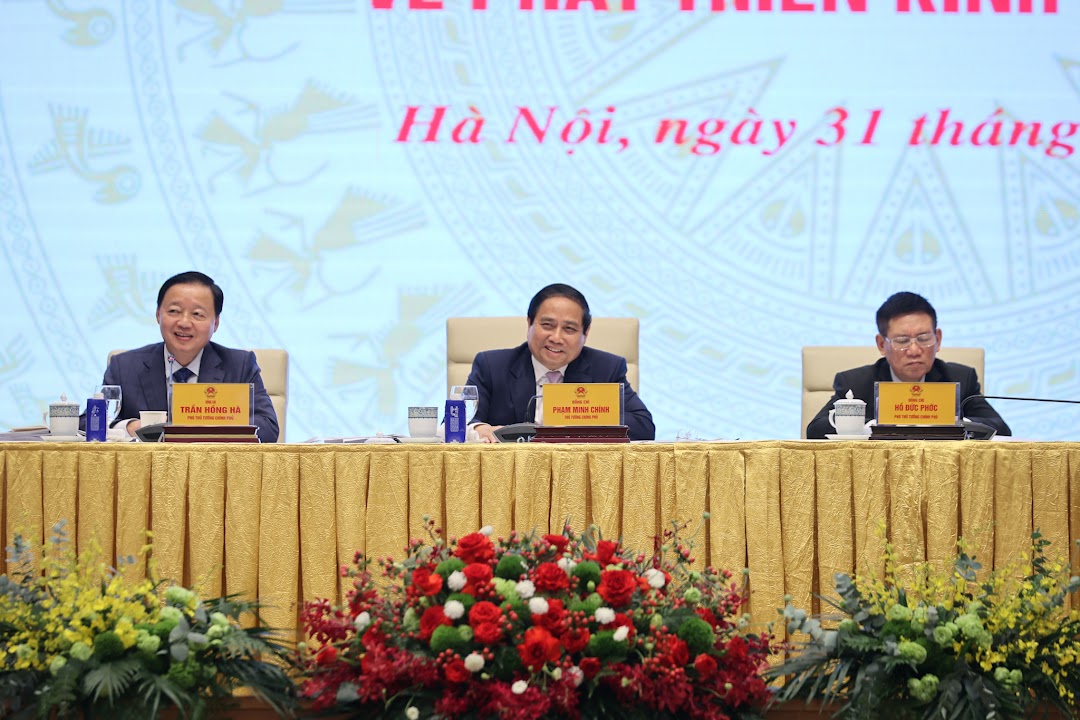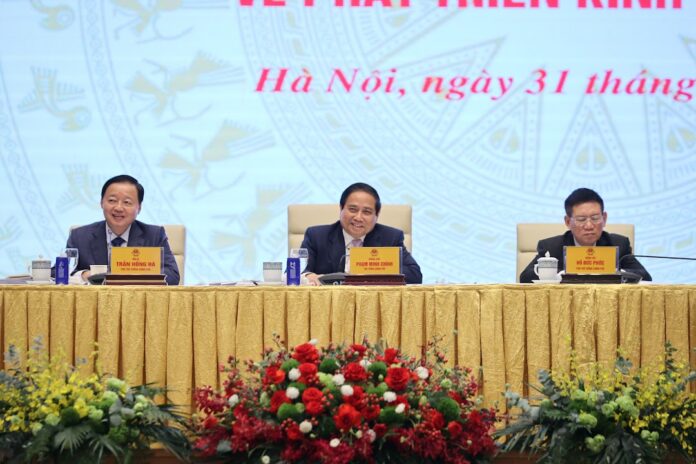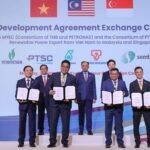The seminar was attended by over 1,000 delegates representing enterprises, business associations, households, and cooperatives. The delegates contributed suggestions and recommendations on policies, tasks, and solutions for private sector development in the upcoming period.
Opening the seminar, Prime Minister Pham Minh Chinh stated that immediately after the Politburo issued Resolution 68, the Government submitted to the National Assembly Resolution 198 on special mechanisms and policies for private sector development. The Government also issued an action program and plan to implement the Resolution.

Prime Minister Pham Minh Chinh, Deputy Prime Ministers Tran Hong Ha and Ho Duc Phoc chair the seminar (Photo: VGP/Nhat Bac)
Following the conference on May 18 to deploy Resolutions 66 and 68 of the Politburo, the Prime Minister answered some questions from delegates. However, many delegates still had additional comments and suggestions. Therefore, the Prime Minister directed the organization of this seminar with enterprises and associations to further discuss the implementation of Resolution 68.
The Prime Minister emphasized that the resolutions of the Politburo, National Assembly, and Government are very consistent and comprehensive. Therefore, the greatest desire is to effectively implement them with the spirit of “thinking deeply and acting significantly.” We need to find the most effective ways to harness the potential of nearly 1 million enterprises and 5 million households, encouraging everyone to contribute so that society can have the resources to “change the state and turn the situation around,” leading to rapid and sustainable national development.
The Prime Minister suggested determining what the State, local authorities, enterprises, and people need to do to deploy the resolutions of the Politburo, National Assembly, and Government regarding private sector development. Additionally, we should foster unity and act with the spirit of “the Party has directed, the Government has unified, the National Assembly has agreed, the people have supported, and the country is expecting—so let’s act, not retreat.”
Speaking at the seminar, Mr. Tran Dinh Long, Chairman of Hoa Phat Group, expressed his enthusiasm for Resolution 68: “The Resolution 68 is fantastic. Six months ago, at a meeting of large enterprises, we also wished and proposed similar ideas, and Resolution 68 has even gone beyond our expectations.”
Mr. Long suggested that after Resolution 68 and Resolution 198 of the National Assembly, the Government’s decrees and circulars should be built with clearer and more specific content.

Mr. Tran Dinh Long, Chairman of Hoa Phat Group, at the seminar on May 31st (Photo: VGP/Nhat Bac)
He emphasized that in the Government’s decrees or in the statements of Government officials, there should be a clear message with a firm stance: “The prerequisite is to protect and promote domestic production.”
Mr. Long gave an example of the “once-in-a-millennium opportunity” presented by the high-speed rail project. If Vietnam wants to develop its domestic railway industry, it must prioritize domestic production. He suggested that all Government resolutions should include clear ratios and be incorporated into specific documents. For instance, he boldly proposed that for all public investment projects, such as highways, the ratio of domestically produced materials and equipment should be at least 70%.
The leader of Hoa Phat Group also pointed out the need for clearer wording in documents to avoid ambiguity. For instance, in the draft decree on placement orders, the phrase “prioritize using domestic goods” should be changed to “must use domestically produced goods” instead of just “prioritize.”
“We strongly recommend that the leadership use clear and supportive language to express their support for domestic production,” Mr. Long concluded.
“Unleashing the Private Sector: Businesses Await Feasible Mechanisms and Tailored Policies.”
The issuance of Resolution 68-NQ/TW by the Political Bureau to promote the private economic sector, followed by specific action plans and mechanisms from the Government and the National Assembly, has been hailed as a groundbreaking move by the business community. The focus now shifts to translating these initiatives into tangible and feasible policies, thereby providing a significant boost to the private sector’s growth and development.
When Vietnam Entered the Top 25 Largest Economies in the World
“Mr. Michael Kokalari, Head of Macroeconomic and Market Research at VinaCapital, asserts that the core vision of Resolution 68 on private economic development is to foster a rapidly growing, sustainable, high-quality, and globally competitive private sector. The UK-based independent economic forecasting center estimates that Vietnam will join the ranks of the world’s 25 largest economies by 2039.”
The Only Vietnamese Business Embarking on a Grand Mission, Witnessed by Three Prime Ministers
This task marks a significant milestone for the renewable energy sector in Vietnam. The country has taken a giant leap forward in its pursuit of a sustainable and green energy future. With this initiative, Vietnam is not just embracing renewable sources but also paving the way for a cleaner, healthier, and more prosperous tomorrow.





















